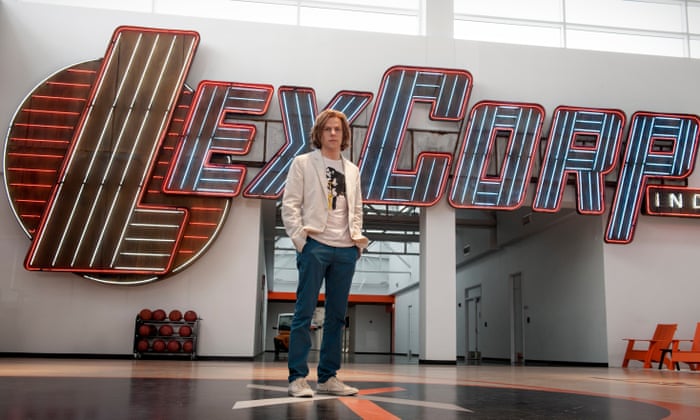From The Guardian:

Jesse Eisenberg played Lex Luthor as an evil nerd in Batman vs Superman.
Photograph: Clay Enos/Warner Bros
Hollywood has a history of drawing on collective fears. The dawn of the atomic age saw a boom in world-ending disasters, James Bond battled Russians all throughout the cold war, and the post-9/11 era saw a grimly predictable rise in Arab and Muslim bad guys. And so it follows, that in the past few years – as the likes of Mark Zuckerberg, Elon Musk and Jeff Bezos have accrued more power, wealth and influence than most governments – the face of villainy has changed again.
Since the turn of the decade, blockbusters have increasingly cast Silicon Valley’s tech bros as supervillains. And it’s not hard to see why. Whether it’s the image of a pallid Zuckerberg hauled up in front of Congress for disrupting democracy, or Jeff Bezos tweeting images of himself piloting giant robots, their public image has been less than gleaming. The meek have inherited the earth, and now they seem hellbent on destroying it.See also:
Until recently of course, blockbuster nerds were benevolent figures. From Jeff Goldblum’s satellite technician in Independence Day to Simon Pegg’s character in the rebooted Mission Impossible series, the computer genius of old was typically on hand to take out security cameras or decode transmissions. They’ve been affable dweebs: physically inept but capable of saving the day with some last-minute, sweat-inducing hacking.
How things have changed. Take Upgrade, currently in cinemas in the US, which tells the story of Grey Trace (Logan Marshall-Green), a mechanic whose wife is murdered in an attack that leaves him quadriplegic, (all after his self-driving car malfunctions and sends them to the bad part of town). Enter a tech-savvy CEO – the less-than-subtly named “Eron Keen” – who offers Grey the chance to walk again, and avenge his wife’s death, with the help of an implant in his spine. As you can probably surmise, the chip is equipped with lots of, shall we say, additional features, and our gracious developer is in turn revealed to have ulterior designs....MORE
The Tropes You'll Need To Know When Writing Your Dystopian Movie Script
Handy hints from a 2014 post:
If you score we would appreciate a producer credit and maybe a point or two of participation.
From Vanity Fair:
Inventories
The Complete List: Everything You Will Find in a Dystopian Movie
The box office’s obsession with teen-centric dystopian films (all teens think the world revolves around them, especially teens trapped in evil oppressive societies) rages steadily onward, thanks to this week’s new release The Giver. Like The Hunger Games and Divergent, the Phillip Noyce film features pulls from some well-read source material: this time around, it’s Lois Lowry’s classic novel of the same name.
Lowry’s book has got more years on it than either Divergent or The Hunger Games, which are still basically in literary infancy, making it far more similar to other standards of the genre, the kind liable to be taught in classrooms, not spawning giddy sold-out crowds at the local multiplex. The hallmarks of the novel are more in line with other classics such as Fahrenheit 451 and Brave New World, books that all made the leap to feature films long before the name “Katniss Everdeen” was on anyone’s lips (and conceivably before the name was even invented). The Giver is the kind of dystopian novel you’d find on a reading list decades ago, but it’s now been gussied up to appeal to a mass audience, thanks to casting choices that include Jeff Bridges, Brenton Thwaites, Meryl Streep, and even Taylor Swift.
Will audiences turn out to see the story of a boy saddled with all the memories and emotions of his future society? Or will they just cobble the movie together based on what came before it? See, The Giver comes from a long line of big-screen dystopias that, over 40 years or so, sure start to look the same after a while.
...MUCH MOREThe Government Is Evil
If there’s one trait that holds together great swathes of dystopian features, it’s a healthy fear of the government. And no, not just a vague sense that your rights might be threatened by your elected overlords, but the deep and unshakable truth that your entire life has been dictated by whole groups of people who ostensibly have your best interests at heart. Whether they’re telling you what to do and who to marry or forcing you to battle to the death as part of a televised event or just plain old killing you off in your prime, dystopian governments are perennial big bads who don’t care if you’re paying their salaries with your taxes.
Check out: A Clockwork Orange, Brave New World, Brazil, Divergent, the Hunger Games series, Fahrenheit 451, Gattaca, The Giver, The Handmaid’s Tale, In Time, Logan’s Run, Nineteen Eighty-Four, Soylent Green, V for Vendetta, THX 1138
